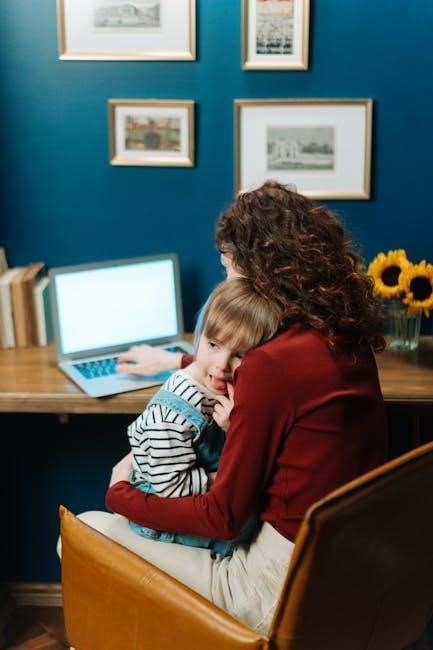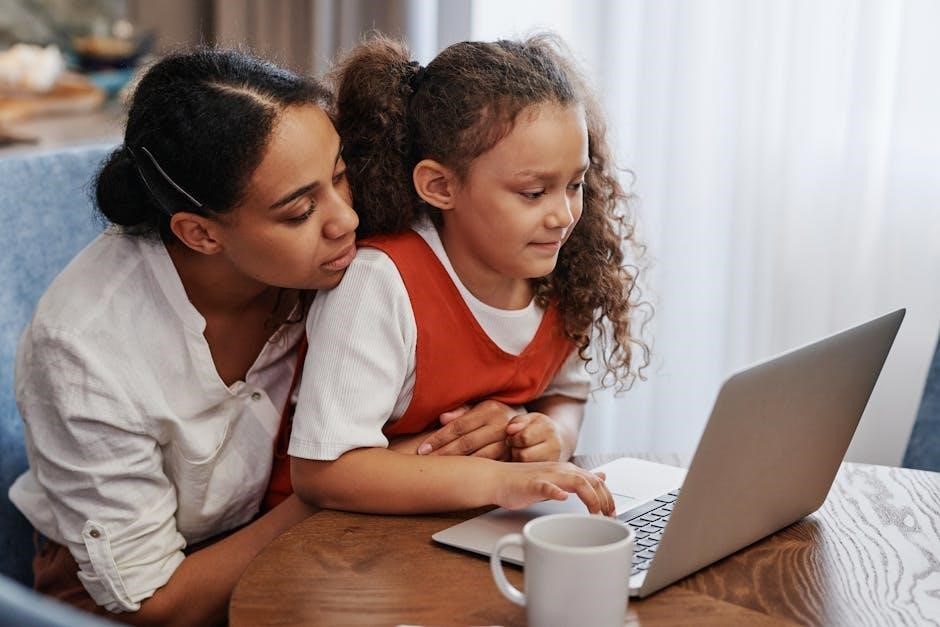Parent education empowers caregivers with skills and knowledge to support child development, combining group and individual approaches to foster collaboration, personalized growth, and stronger family well-being.

Definition and Scope of Parent Education
Parent education refers to intentional learning opportunities designed to enhance caregivers’ skills, knowledge, and confidence in supporting their children’s development. It addresses diverse family needs, fostering positive parent-child relationships and improving communication. The scope includes group and individual approaches, providing evidence-based strategies for emotional, social, and academic growth. Parent education bridges gaps between home and school, ensuring consistency in a child’s educational journey. It emphasizes accountability, offering measurable outcomes that benefit families and communities. By equipping parents with tools to navigate modern challenges, parent education creates supportive environments for lifelong learning and resilience, ultimately empowering caregivers to raise capable, confident, and compassionate individuals.
Importance of Parent Education in Child Development
Parent education plays a vital role in child development by empowering caregivers with evidence-based strategies to support emotional, social, and academic growth. It fosters positive parent-child relationships, improves communication, and equips parents to address challenges effectively. By enhancing caregivers’ confidence and skills, parent education creates nurturing environments that promote resilience and lifelong learning. It bridges gaps between home and school, ensuring consistency in a child’s educational journey. Parent education also addresses diverse family needs, providing tailored support to create supportive environments for all children. Ultimately, it empowers parents to raise capable, confident, and compassionate individuals, benefiting both families and communities by fostering a strong foundation for future success.
Evolution of Parent Education Programs
Parent education has evolved from informal community initiatives to structured, evidence-based programs. Early efforts focused on improving home environments through parent-teacher associations and home economics movements. The 1960s and 1970s introduced group-based programs like the Incredible Years, emphasizing child development and parenting skills. The 21st century brought hybrid models, blending group and individual approaches to address diverse family needs. This shift reflected growing recognition of parenting challenges’ complexity and the need for tailored support. Modern programs integrate technology and community partnerships, enhancing accessibility and effectiveness. Historical developments highlight parent education’s adaptability, aligning with societal changes and advancing understanding of child and family well-being. Today, it continues to innovate, ensuring comprehensive support for caregivers.

Key Concepts and Principles
Parent education combines group and individual approaches, fostering collaboration and personalized growth. It empowers caregivers through tailored strategies, promoting strong relationships and addressing diverse family needs effectively.
Empowering Caregivers Through Education
Parent education equips caregivers with essential skills and knowledge, enhancing their confidence and ability to support their children’s development. By addressing diverse needs, it fosters positive parent-child interactions and improves communication. This approach provides evidence-based strategies, promoting emotional, social, and academic growth in children. It bridges gaps between home and school, ensuring consistency in a child’s educational journey. Effective parent education emphasizes accountability, offering measurable outcomes that benefit families and communities. Ultimately, it empowers parents with tools to navigate modern parenting challenges, creating supportive environments that encourage lifelong learning and resilience. This empowerment is central to fostering a nurturing and equitable environment for all families.
Combining Group and Individual Approaches
Parent education effectively combines group and individual approaches to support diverse family needs. Group settings foster collaboration, shared learning, and mutual support, while individualized attention addresses unique challenges and circumstances. This hybrid model ensures comprehensive support, tailoring strategies to meet the specific requirements of each caregiver. Group activities encourage shared experiences and peer learning, while individual support provides personalized guidance. By integrating both methods, parent education programs create a balanced approach that empowers caregivers to navigate parenting challenges effectively. This combination not only strengthens family dynamics but also promotes overall child well-being, ensuring that all caregivers receive the tools and confidence needed to support their children’s development successfully.
Fostering Collaboration and Personalized Growth
Parent education fosters collaboration by creating environments where caregivers can share experiences, learn from one another, and build supportive relationships. This collaborative approach encourages open dialogue, mutual understanding, and collective problem-solving. At the same time, personalized growth is achieved by addressing individual needs, ensuring tailored strategies for each caregiver. By combining group interactions with individualized support, parent education empowers caregivers to develop confidence and skills tailored to their unique circumstances. This dual focus on collaboration and personalization ensures that parents gain both practical knowledge and emotional support, enabling them to navigate parenting challenges effectively while fostering healthy relationships with their children;

Group-Based Parent Education
Group-based parent education fosters a collaborative environment where caregivers share experiences, learn together, and gain practical strategies to enhance parenting skills and child development.
Designing Effective Educational Content for Groups
Designing effective educational content for group parent education requires tailoring materials to meet diverse learning needs. Incorporating interactive activities, real-life scenarios, and practical strategies ensures engagement and applicability. Content should be structured to promote active participation, fostering a supportive environment where parents can share experiences and learn from one another. Integrating evidence-based practices and current research ensures the information is relevant and actionable. Clear objectives and measurable outcomes guide the development process, ensuring that the content addresses key aspects of parenting, such as communication, discipline, and child development. Regular feedback from participants helps refine the content, making it more effective and responsive to their needs. This approach empowers parents with the tools and confidence to support their children’s growth effectively.
Facilitation Skills for Leading Parent Groups

Effective facilitation skills are essential for leading parent groups, ensuring engaging and productive sessions. Key skills include active listening, empathy, and creating a safe, inclusive environment. Facilitators should encourage open dialogue, manage diverse perspectives, and guide discussions to meet learning objectives. Techniques like asking open-ended questions, using non-verbal cues, and summarizing key points help maintain focus and participation. Additionally, facilitators should be adept at addressing challenging behaviors and fostering collaboration among group members. Building rapport and establishing trust are crucial for creating a supportive atmosphere where parents feel comfortable sharing experiences and learning from one another. Continuous improvement through self-reflection and feedback enhances facilitation effectiveness, ensuring that parent groups achieve their intended outcomes and foster meaningful growth for participants.
Managing Difficult Moments in Group Settings
Managing difficult moments in parent groups requires a combination of empathy, active listening, and strategic intervention. Facilitators should remain calm and composed, addressing conflicts or disruptive behaviors promptly. Techniques like redirecting the conversation or setting clear expectations can help maintain focus. Encouraging respectful communication and fostering an inclusive environment are key to resolving tensions. Recognizing and validating emotions can prevent escalation. Facilitators should also be prepared to handle challenging behaviors, such as dominance by a few individuals or resistance to new ideas. By staying attuned to group dynamics and using non-verbal cues, facilitators can guide the discussion back to constructive dialogue. Effective management of difficult moments preserves group cohesion and builds trust, ensuring all participants feel heard and supported.

Promoting Accountability in Group Education
Promoting accountability in group parent education involves fostering a culture of responsibility and engagement. Clear goal-setting and regular progress checks help participants stay committed. Facilitators should encourage open discussions about challenges and successes, creating a supportive environment where parents feel motivated to apply what they learn. Providing actionable strategies and resources empowers parents to take ownership of their development. Celebrating milestones and offering constructive feedback reinforces accountability. By emphasizing the importance of active participation and follow-through, facilitators can ensure that parents remain dedicated to improving their skills and contributing positively to the group dynamic. This approach enhances individual growth and strengthens collective efforts, leading to more effective outcomes for both parents and their children.
Individualized Parent Education
Individualized parent education provides personalized support, addressing unique needs and circumstances to empower caregivers with tailored strategies for effective parenting and child development.
Understanding Individual Learning Needs
Understanding individual learning needs is crucial in parent education, as each caregiver’s circumstances, such as cultural background, education level, and personal experiences, influence their learning approach. Assessing these needs allows educators to tailor strategies, ensuring effective support. For instance, some parents may benefit from hands-on activities, while others prefer structured guidance. Recognizing these differences enables targeted interventions, fostering a supportive environment where parents can thrive. This personalized approach addresses specific challenges and empowers parents to apply what they learn. By adapting to individual learning needs, parent educators create meaningful experiences that promote positive parenting practices and improve child outcomes, ensuring equitable opportunities for all families to grow and succeed.
Personalized Strategies for Individual Support
Personalized strategies for individual support in parent education focus on tailoring interventions to meet the unique needs and circumstances of each caregiver. This approach recognizes that cultural background, education level, and personal experiences significantly influence learning preferences. By understanding these factors, educators can develop targeted plans that address specific challenges, such as communication barriers or parenting style differences. Strategies may include one-on-one coaching, customized action plans, and adaptive learning materials. Empowering parents through individualized support fosters confidence and equips them with practical tools to navigate parenting challenges effectively. This personalized approach ensures that each caregiver receives the guidance they need to create a nurturing environment for their child’s development, ultimately enhancing overall family well-being and resilience.
Case Studies in Individual Parent Education
Case studies in individual parent education highlight the effectiveness of tailored approaches in addressing unique family dynamics and challenges. These real-life examples demonstrate how personalized strategies empower caregivers to overcome specific obstacles, such as communication barriers or disciplinary concerns. For instance, a parent struggling with cultural differences in parenting styles may benefit from culturally sensitive guidance, while another may require support in managing a child’s special needs. By analyzing these cases, educators can identify patterns and refine their methods to better serve diverse populations. Such studies also illustrate the importance of adaptability and empathy in fostering positive parent-child relationships. They provide valuable insights into the practical application of individualized parent education, showcasing its transformative impact on family well-being and child development.

Strategies for Effective Parent Education
Effective parent education involves practical strategies like setting realistic goals, fostering communication, and teaching problem-solving skills, ensuring evidence-based methods to empower caregivers and promote child well-being.
Practical Strategies for Handling Parenting Challenges
Practical strategies for handling parenting challenges include active listening, empathy, and problem-solving techniques. These methods help caregivers address behavioral issues and emotional needs effectively. Workshops and resources provide actionable tools, such as setting realistic goals and fostering open communication. By incorporating these strategies, parents can build resilience and confidence, creating a supportive environment for their children. These approaches emphasize understanding and addressing individual needs, ensuring tailored solutions for diverse family dynamics. Ultimately, practical strategies empower parents to navigate challenges with clarity and compassion, promoting healthy relationships and child development.
Setting Realistic Goals for Families
Setting realistic goals for families is a cornerstone of effective parent education. By establishing clear, achievable objectives, parents can create a structured environment that supports child development and strengthens family dynamics. Goals should be specific, measurable, and aligned with the family’s unique needs and values. Collaborative efforts between parents and educators ensure that these goals are practical and tailored to individual circumstances. Breaking larger objectives into smaller, manageable steps helps families stay focused and motivated. Regularly reviewing and adjusting these goals fosters adaptability and ensures continued progress. This approach not only enhances parental confidence but also promotes a supportive and nurturing environment for children to thrive.
Building Strong, Healthy Relationships
Building strong, healthy relationships is a fundamental aspect of parent education, fostering emotional bonds and communication between parents and children. By teaching caregivers effective strategies like active listening, empathy, and positive reinforcement, parent education helps create a nurturing environment. These practices encourage mutual respect, trust, and understanding, laying the foundation for resilient and confident children. Parent education also emphasizes the importance of modeling healthy relationships, as children often mimic the interactions they observe. Strengthening these connections not only enhances family dynamics but also equips children with essential social and emotional skills. By prioritizing relationship-building, parent education supports the development of well-adjusted, compassionate individuals capable of forming meaningful connections throughout their lives.

Community and School Partnerships

Community and school partnerships enhance parent education by integrating resources, workshops, and collaborative efforts, fostering shared goals for child development and family well-being.
Integrating Parent Education into School Culture
Integrating parent education into school culture involves creating a collaborative environment where schools and families work together to support child development. Schools can achieve this by offering workshops, resources, and activities that engage parents in their children’s education. By fostering open communication and providing accessible materials, such as downloadable PDF guides, schools can empower parents with practical strategies for parenting challenges. This integration ensures consistency between home and school, promoting a cohesive approach to learning and development. Effective integration also involves training educators to facilitate parent-teacher partnerships, ensuring that parent education aligns with school goals. This collaborative effort strengthens family engagement, enhances academic support, and builds a supportive community focused on student success and well-being.
Resources for Family Engagement
Resources for family engagement include downloadable PDF guides, workbooks, and online toolkits designed to support parents in their educational journey. These materials provide practical strategies for addressing parenting challenges, setting realistic goals, and fostering strong, healthy relationships with children; Schools and educators can utilize these resources to create a bridge between home and school, ensuring consistency in a child’s learning environment. By offering accessible and evidence-based tools, parents are empowered to actively participate in their children’s education. These resources often include interactive activities, real-life scenarios, and frameworks that cater to diverse family needs, promoting equity and inclusivity in family engagement initiatives.
Partnerships in Parenting Workshops
Partnerships in Parenting Workshops are designed to foster collaboration and mutual support among caregivers. These workshops provide a platform for sharing experiences, challenges, and strategies, creating a supportive environment for learning and growth. By encouraging open dialogue and active participation, they help parents build strong, healthy relationships with their children. Workshops often include interactive activities, group discussions, and practical exercises to address common parenting challenges. Facilitators guide participants in setting realistic goals and applying evidence-based strategies to real-life situations. The focus is on building trust and cohesion within the group, ensuring that all participants feel supported and empowered. These workshops are a valuable resource for parents seeking to enhance their parenting skills and create a nurturing environment for their children’s development.
Future Directions in Parent Education
Future directions in parent education emphasize technology integration, expanding accessibility through downloadable PDF resources, and continuous improvement to support diverse family needs effectively.
Innovative Approaches and Technology Integration
Innovative approaches in parent education leverage technology to enhance accessibility and engagement; Digital tools, such as downloadable PDF resources and online platforms, provide flexible learning opportunities for caregivers. These solutions allow parents to access evidence-based strategies and interactive modules at their convenience, fostering continuous learning. Technology also supports hybrid models of parent education, blending group and individual approaches seamlessly. For instance, virtual workshops and webinars enable broader reach, while personalized apps offer tailored guidance. Such innovations ensure that parent education remains adaptable to modern challenges, empowering caregivers with practical skills and fostering stronger connections between home and school environments. This integration of technology not only improves accessibility but also strengthens the overall effectiveness of parent education programs.
Expanding Accessibility Through PDF Resources
PDF resources have become a cornerstone in expanding accessibility for parent education, offering comprehensive guidance and practical strategies for caregivers. These downloadable materials provide flexible learning opportunities, enabling parents to access information at their convenience. PDFs often include worksheets, evidence-based practices, and frameworks that address diverse parenting challenges. They are particularly valuable for educators, counselors, and social workers, serving as tools to support parents effectively. By making these resources widely available, PDFs ensure that parent education reaches a broader audience, fostering equity and inclusivity. Their portability and ease of sharing also facilitate integration into school cultures and community programs, ensuring consistent and high-quality support for families. This approach underscores the commitment to making parent education accessible to all, regardless of location or background.
Continuous Improvement in Parent Education
Continuous improvement in parent education involves ongoing self-evaluation and adaptation to meet the evolving needs of families. By integrating research-based practices and professional learning materials, educators refine their approaches to better support parents. Regular feedback from participants and practitioners helps identify areas for enhancement, ensuring programs remain relevant and effective. This iterative process fosters innovation, allowing parent education to stay aligned with societal changes and advancements in child development. Through continuous improvement, parent education becomes more responsive, equitable, and impactful, ultimately benefiting both families and communities. This commitment to growth ensures that parent education remains a dynamic and effective tool for empowering caregivers.

